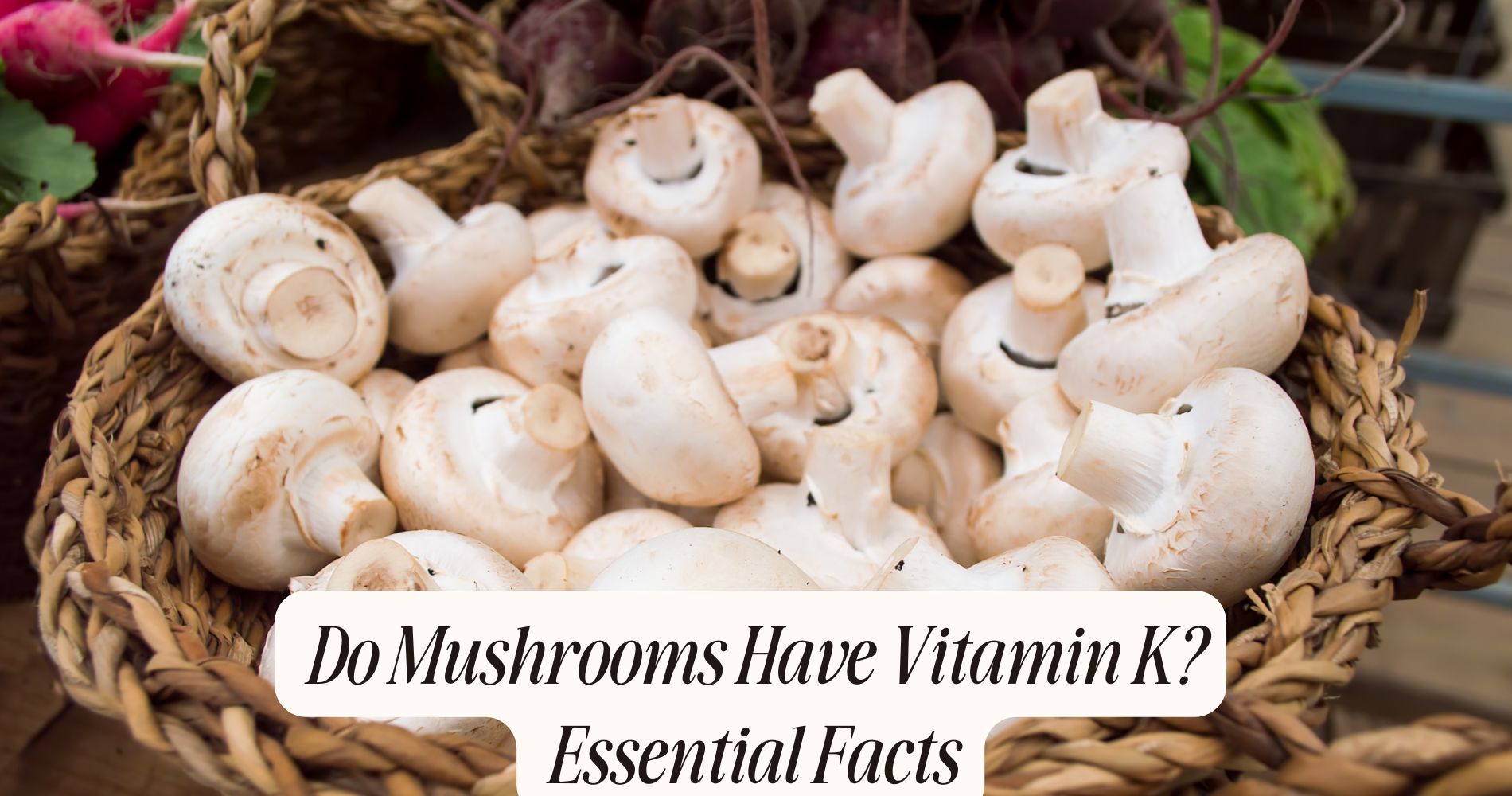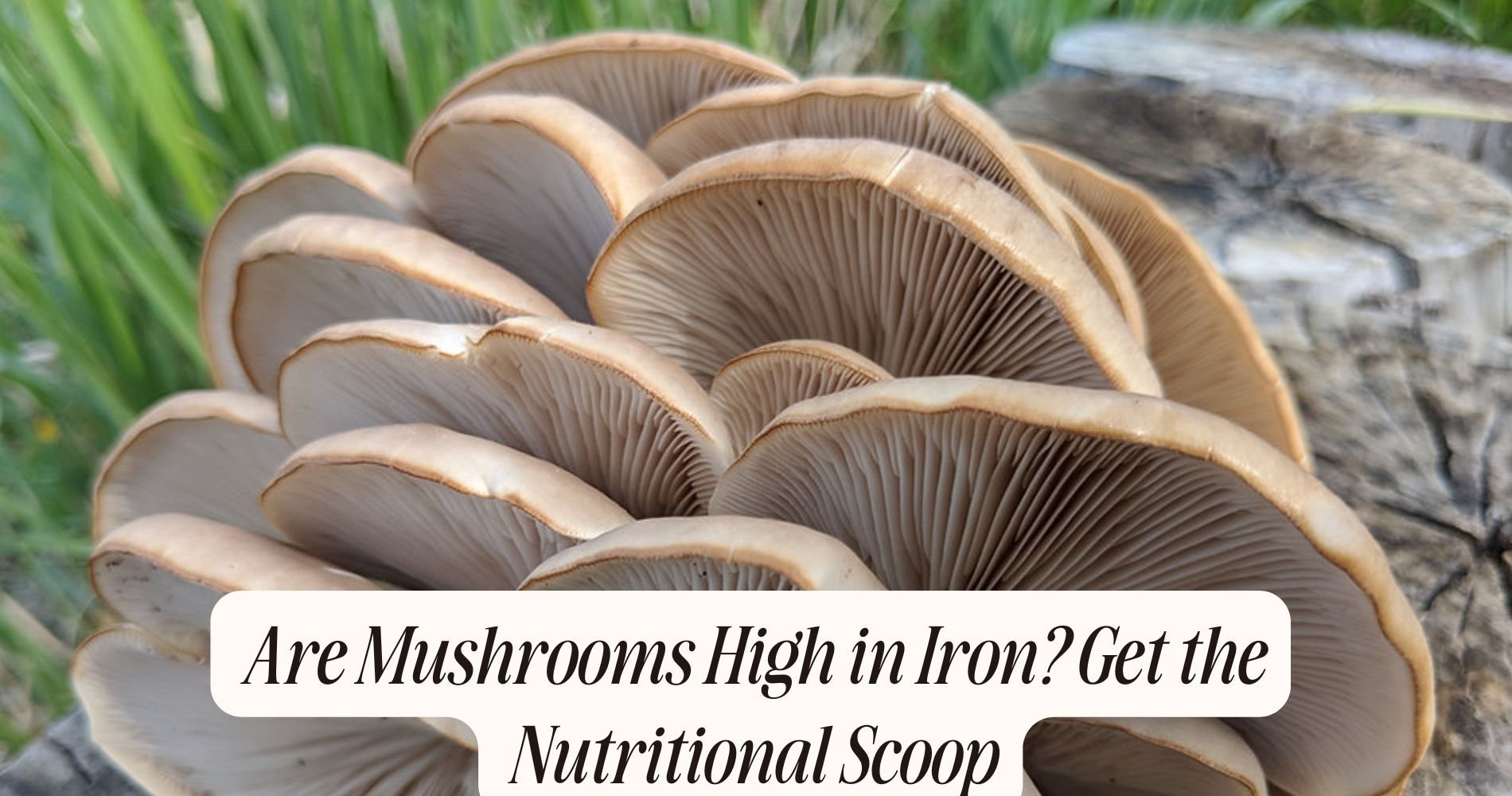
Do Mushrooms Have Vitamin K? Essential Facts
Do mushrooms have vitamin K? Yes, mushrooms do contain vitamin K, though the amounts vary by type. Shiitake mushrooms, for instance, are particularly high in vitamin K2, which supports bone health and aids calcium absorption. On the other hand, white button mushrooms offer minimal levels of vitamin K. While they can enhance your overall nutrient intake, they shouldn't be your sole source of vitamin K. Incorporating a variety of mushrooms in your meals can add flavor and diverse nutrients. If you're curious about how to maximize the benefits of mushrooms in your diet, there's plenty more to discover.
Understanding Vitamin K
When you think about essential nutrients, vitamin K mightn't be the first one that comes to mind, but it plays a significant role in your body. This fat-soluble vitamin is fundamental for blood clotting, helping to prevent excessive bleeding when you get injured.
Vitamin K also supports bone health by aiding in the regulation of calcium within your bones and blood, reducing the risk of fractures.
You can find various vitamin K sources in your diet. Leafy greens like kale and spinach are particularly rich in this nutrient. Other sources include broccoli, Brussels sprouts, and certain vegetable oils.
Fermented foods, such as natto, also provide a significant amount of vitamin K2, which is beneficial for bone and cardiovascular health.
Understanding vitamin K functions helps you appreciate its importance. It's essential for synthesizing proteins involved in blood coagulation and bone metabolism.
A deficiency in vitamin K could lead to problems like excessive bleeding or weakened bones. By incorporating vitamin K-rich foods into your meals, you can support your overall health and guarantee your body functions at its best.
Nutritional Profile of Mushrooms
When you consider the nutritional profile of mushrooms, you'll find they're packed with essential nutrients.
These fungi provide a range of vitamins, including B vitamins and vitamin D, while also contributing minerals like selenium and potassium.
Understanding their vitamin content is vital for appreciating their role in a balanced diet.
Key Nutrients in Mushrooms
Mushrooms serve as a nutritional powerhouse, packed with essential vitamins and minerals that contribute to overall health. Different mushroom varieties, such as shiitake, portobello, and maitake, offer unique nutrient profiles, making them versatile additions to your diet.
These fungi are rich in B vitamins, including riboflavin, niacin, and pantothenic acid, which play crucial roles in energy production and cellular function.
Mushrooms are also a great source of minerals like selenium, potassium, and copper. Selenium acts as a powerful antioxidant, supporting immune function, while potassium aids in maintaining healthy blood pressure levels. Copper is essential for red blood cell production and iron absorption.

Moreover, the fiber content in mushrooms promotes gut health and enhances nutrient absorption. The presence of polysaccharides like beta-glucans may support immune system function, further highlighting their health benefits.
Including a variety of mushrooms in your meals can help you maximize the range of nutrients you consume, ensuring you reap their full health rewards. So, whether you're sautéing them in a dish or adding them to a salad, mushrooms can greatly boost your nutritional intake.
Vitamin Content Overview
Packed with a variety of vitamins, mushrooms can greatly enhance your nutritional intake. Different mushroom varieties offer unique vitamin profiles, making them versatile additions to your diet.
For instance, shiitake mushrooms are known for their high levels of B vitamins, particularly B2 (riboflavin) and B5 (pantothenic acid), which play significant roles in energy metabolism. Conversely, portobello mushrooms provide a good source of selenium, an important antioxidant.
When it comes to vitamin K, some mushrooms, like maitake and certain types of shiitake, contain moderate amounts. This vitamin is essential for blood clotting and bone health, aiding in calcium absorption. Incorporating these mushrooms into your meals can help improve your vitamin absorption overall.
Additionally, mushrooms are a rich source of vitamin D, especially when exposed to sunlight or UV light. This vitamin is crucial for bone health and immune function.
Types of Mushrooms and Vitamin K
When you explore the types of mushrooms available, you'll find varying levels of vitamin K in each variety.
Common mushrooms like shiitake and portobello not only add flavor but also pack beneficial nutrients.
Understanding their vitamin K content can help you make informed choices for your health.
Vitamin K Content Comparison
Often overlooked in discussions about dietary sources of Vitamin K, mushrooms can vary considerably in their vitamin content depending on the type. Some mushroom varieties are surprisingly rich in Vitamin K, while others contain only trace amounts.
For instance, shiitake mushrooms are known for their higher Vitamin K2 content, which plays a crucial role in calcium metabolism and bone health. On the other hand, white button mushrooms offer minimal amounts of Vitamin K.
When you include different types of mushrooms in your diet, you can enhance your vitamin absorption greatly. The bioavailability of Vitamin K in mushrooms can also be affected by cooking methods; sautéing or grilling can sometimes increase its absorption, making it more beneficial for your health.
If you're aiming to boost your Vitamin K intake, focusing on specific mushroom varieties like shiitake or maitake can be a helpful strategy.
Remember that variety is key in any diet, so incorporating a range of mushrooms can guarantee you're getting not only Vitamin K but also other essential nutrients.
Common Mushroom Varieties
Mushrooms come in various types, each offering distinct nutritional benefits, particularly concerning Vitamin K. Common varieties include white button mushrooms, shiitake, and portobello, all of which are edible species that provide unique flavor profiles and culinary uses.
For instance, white button mushrooms are mild and versatile, making them ideal for salads and soups, while shiitake mushrooms have a rich, umami flavor perfect for stir-fries.
When it comes to health benefits, certain gourmet mushrooms, like maitake and reishi, are renowned for their medicinal properties, which may contribute to overall wellness.

Cooking techniques can enhance their nutritional value; sautéing or roasting mushrooms can boost their flavor while retaining essential nutrients.
Storage methods are essential to maintaining the quality of these wild mushrooms. Keep them in a paper bag in the fridge to prevent moisture buildup, which can lead to spoilage.
Always verify you're choosing fresh, high-quality varieties to maximize their benefits. By understanding the different mushroom varieties and their uses, you can easily incorporate them into your diet, enhancing both flavor and nutrition.
Health Benefits of Vitamin K
A variety of mushrooms can greatly contribute to your Vitamin K intake, which plays an essential role in blood clotting and bone health.
Vitamin K is important for synthesizing proteins that regulate blood coagulation, helping prevent excessive bleeding when injuries occur. In addition, it's critical for bone metabolism, as it aids in the binding of calcium to bone matrix proteins, enhancing bone strength and reducing fracture risk.
Different types of mushrooms, like shiitake and portobello, are particularly high in Vitamin K. Including these mushrooms in your diet can help you meet your daily requirements, supporting your overall health.
Research indicates that adequate Vitamin K intake may also lower the risk of osteoporosis and cardiovascular diseases, showcasing its extensive health benefits.
Health Benefits of Vitamin K
Vitamin K plays an essential role in maintaining your overall health, particularly when it comes to blood clotting and bone strength. This important nutrient helps activate proteins that regulate blood coagulation, preventing excessive bleeding when you get injured.
Additionally, vitamin K is imperative for bone metabolism, as it aids in the binding of calcium to bone matrix proteins, promoting stronger bones and reducing the risk of fractures.
When it comes to vitamin K sources, mushroom varieties like shiitake and portobello are excellent options. These fungi not only provide a savory addition to meals but also contribute to your daily vitamin K intake. Incorporating these mushrooms into your diet can help guarantee you receive adequate amounts of this essential nutrient.
Research shows that a diet rich in vitamin K may also support cardiovascular health by preventing arterial calcification, which can lead to heart disease.
Comparing Mushrooms to Other Sources
When exploring the nutritional landscape, it's essential to recognize the diverse sources of vitamin K available. While mushroom varieties like shiitake and maitake provide a modest amount, they're not the most potent sources.
Green leafy vegetables, such as kale and spinach, are far richer in vitamin K1, which is vital for blood clotting.
If you're looking for vitamin K2, fermented foods like natto and certain cheeses are excellent choices. These foods can greatly boost your vitamin K intake compared to what you'd get from mushrooms.

However, mushrooms do offer a unique benefit; they contain other nutrients and antioxidants that can contribute to your overall health.
Incorporating a variety of vitamin sources into your diet is key. While mushrooms add flavor and texture to meals, relying solely on them for vitamin K mightn't meet your nutritional needs.
So, consider combining different foods, including those high in vitamin K, to guarantee you're getting a balanced intake.
How to Incorporate Mushrooms
Mushrooms can be a versatile addition to your meals, enhancing both flavor and nutrition. To incorporate them effectively, consider various mushroom recipes that highlight their unique qualities. For example, try sautéing seasonal varieties like shiitake or oyster mushrooms with garlic and herbs for a delicious side dish. These flavor pairings can elevate your meals, making them more satisfying.
When meal planning, think about your dietary preferences. Mushrooms are great for vegetarian and vegan dishes, serving as a hearty substitute for meat. Use them in pasta, stir-fries, or grain bowls to create texture contrasts that keep your meals interesting.
Explore different sautéing techniques to bring out their rich umami flavor. You can also experiment with ingredient substitutions; for instance, replace meat in tacos with diced mushrooms for a healthier twist.
Don't forget about serving suggestions! Top your salads with sautéed mushrooms or add them to omelets for a nutritious breakfast.
Cooking Methods and Nutrient Retention
Proper cooking methods greatly impact nutrient retention in mushrooms, ensuring you get the most health benefits from this nutritious food.
Steaming mushrooms is one of the best techniques to preserve their vitamins, including vitamin K, as it minimizes nutrient leaching while maintaining flavor. Sautéing techniques with minimal oil can also help retain nutrients and enhance the natural taste without excessive cooking times.
On the other hand, grilling methods can boost flavor but may result in some nutrient loss, particularly if overcooked. Baking effects tend to be similar, where prolonged exposure to heat can degrade certain vitamins.
Boiling impacts are often the most detrimental, as water-soluble nutrients leach into the cooking water, considerably reducing the mushrooms' health benefits.
Frying choices can vary; using high heat for short periods can help retain some nutrients, but be cautious of excessive oil, which can add unwanted calories.
While raw consumption offers the maximum vitamin retention, many people prefer cooked mushrooms for their flavor and texture. Understanding these cooking methods allows you to enjoy mushrooms while maximizing their nutritional value.
Potential Deficiencies and Risks
Vitamin K plays an essential role in blood clotting and bone health, and the absence of sufficient amounts can lead to potential deficiencies and health risks. If your diet lacks adequate vitamin K, you may be at risk for excessive bleeding or weakened bones, increasing your chances of fractures.
This deficiency is particularly concerning for certain populations, such as the elderly or individuals with absorption issues.
Mushroom cultivation can be a practical way to boost your vitamin K intake. Varieties like shiitake and portobello are known to contain notable amounts of this crucial nutrient. However, relying solely on mushrooms mightn't suffice if your overall diet lacks diversity.

It's critical to recognize that vitamin deficiency can lead to long-term health complications. Symptoms of deficiency can include easy bruising, gum bleeding, and in severe cases, osteoporosis.
Incorporating a balanced diet rich in fruits, vegetables, and fermented foods can help mitigate these risks. By understanding the importance of vitamin K and the role mushrooms can play, you can make more informed dietary choices to maintain your health.
Tips for Maximizing Nutrient Intake
To maximize your nutrient intake effectively, consider incorporating a variety of foods rich in vitamins and minerals into your meals. Focus on including dark leafy greens, colorful fruits, and a range of mushrooms, as they provide essential nutrients, including vitamin K.
To enhance nutrient absorption, combine these foods with healthy fats, like olive oil or avocado, since fat-soluble vitamins require fat for peak absorption.
Pay attention to your cooking techniques as well. Steaming vegetables rather than boiling them can help retain more vitamins, including vitamin K. High heat can destroy some nutrients, so consider sautéing or roasting your vegetables at lower temperatures.
When preparing mushrooms, avoid excessive cooking time, as this can reduce their nutrient content.
Also, remember that consuming raw and cooked foods can provide different benefits. For instance, some nutrients become more bioavailable when mushrooms are cooked.
Finally, consider diversifying your diet by trying various types of mushrooms, like shiitake or portobello, to maximize your vitamin K intake.
Frequently Asked Questions
Can Mushrooms Interact With Blood-Thinning Medications?
Mushroom types like shiitake and portobello contain vitamin K, which can interact with blood-thinning medications. If you're on such medications, it's best to monitor your mushroom intake and consult your doctor for personalized advice.
Are There Mushroom Varieties High in Vitamin K?
Certain mushroom types, like shiitake and natto, are excellent vitamin K sources. If you're looking to boost your intake, incorporating these varieties into your diet can markedly enhance your vitamin K levels effectively.
How Does Cooking Affect Vitamin K Levels in Mushrooms?
Cooking methods can impact vitamin retention in mushrooms. While sautéing or steaming preserves more vitamins, boiling may cause significant loss. To maximize vitamin K, consider gentle cooking techniques that minimize exposure to heat and water.
Can I Get Enough Vitamin K From Mushrooms Alone?
You can't rely solely on mushrooms for adequate vitamin K. While they contribute to your mushroom nutrition, their levels aren't high enough for sufficient vitamin absorption. Combine them with other sources for ideal intake.
Do Mushrooms Provide Other Essential Vitamins and Minerals?
Yes, mushrooms provide various essential vitamins and minerals beyond vitamin K. Their nutrition profile includes B vitamins, selenium, and copper, making them valuable vitamin sources that enhance your overall diet and support your health effectively.
Conclusion
Incorporating mushrooms into your diet can boost your vitamin K intake, alongside other essential nutrients. While they may not be the richest source, different types of mushrooms offer varying amounts of this crucial vitamin. By choosing diverse cooking methods and pairing them with other nutrient-rich foods, you can maximize your health benefits. Stay aware of potential deficiencies and actively include mushrooms in your meals to support your overall wellness.




